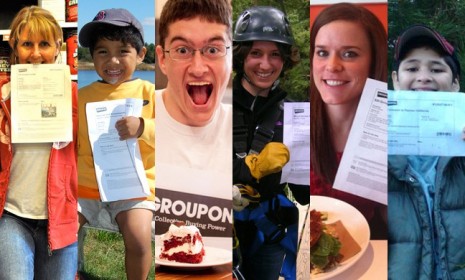The Groupon phenomenon: A timeline
The daily-deals website is the fastest growing online venture ever. How did it get so big so quickly?

A free daily email with the biggest news stories of the day – and the best features from TheWeek.com
You are now subscribed
Your newsletter sign-up was successful
Groupon, the phenomenally popular website that offers daily discount coupons for use at restaurants, retailers, and other local businesses, is on a serious roll. In just two years, the site has managed to attract millions of users. And now, Google wants in. The tech giant has offered a staggering $6 billion to acquire Groupon, the search giant's largest acquisition bid to date. How did Groupon get so big so fast? Here's a timeline of its startling rise:
2007: Andrew Mason, a Northwestern University graduate living in Chicago, launches ThePoint.com, "an online platform for petitioners to muster support for all sorts of causes,." One campaign attracts 1,000 people eager to commit money toward solving Africa's AIDS crisis "on the condition that U2 front man Bono would retire from public life."
November 2008: After ThePoint.com fails to attract enough ad revenue to stay afloat, Mason tries his luck with daily-deals site Groupon. Every deal on Groupon needs to attract a certain percentage of takers for it to be valid; 98 percent of deals currently meet the necessary criteria. The site debuts with Chicago-specific deals before spreading to Boston, New York, and other cities.
The Week
Escape your echo chamber. Get the facts behind the news, plus analysis from multiple perspectives.

Sign up for The Week's Free Newsletters
From our morning news briefing to a weekly Good News Newsletter, get the best of The Week delivered directly to your inbox.
From our morning news briefing to a weekly Good News Newsletter, get the best of The Week delivered directly to your inbox.
2009-2010: The company rapidly expands into new cities in the U.S. and around the world. It now serves more than 150 markets domestically, and 100 more worldwide. Such explosive growth forces employees to meet monthly in a Chicago church instead of in Groupon's original offices. Meanwhile, a bevy of Groupon competitors and copycats appear. Some, like Living Social, BuyWithMe, or Facebook's new "Deals" section come from established social media players with venture capital backing; others are start-ups, or individuals trying to get rich quick.
April 2010: Groupon raises $135 million from Digital Sky Technologies, a Russian investment firm. The deal is seen as "signifying that social buying has rapidly matured into a real business."
May 2010: Groupon acquires German "clone" CityDeal, doubling its global reach.
August 2010: The company is valued at $1.5 billion, beating out Priceline.com as the fastest company to ever reach the $1 billion in sales.
A free daily email with the biggest news stories of the day – and the best features from TheWeek.com
November 30, 2010: Google reportedly offers $6 billion to acquire Groupon. This is almost twice as much as Google's largest purchase to date, the $3.1 billion it paid for Doubleclick in 2007. Groupon expects to raise $500 million in revenue in 2010, and, says one prominent venture capitalist, the company "remains on a torrid growth curve in terms of audience growth."
Sources: Venturebeat, Digital Journal, Forbes, CNBC, TechCrunch, the New York Times
-
 Political cartoons for February 3
Political cartoons for February 3Cartoons Tuesday’s political cartoons include empty seats, the worst of the worst of bunnies, and more
-
 Trump’s Kennedy Center closure plan draws ire
Trump’s Kennedy Center closure plan draws ireSpeed Read Trump said he will close the center for two years for ‘renovations’
-
 Trump's ‘weaponization czar’ demoted at DOJ
Trump's ‘weaponization czar’ demoted at DOJSpeed Read Ed Martin lost his title as assistant attorney general